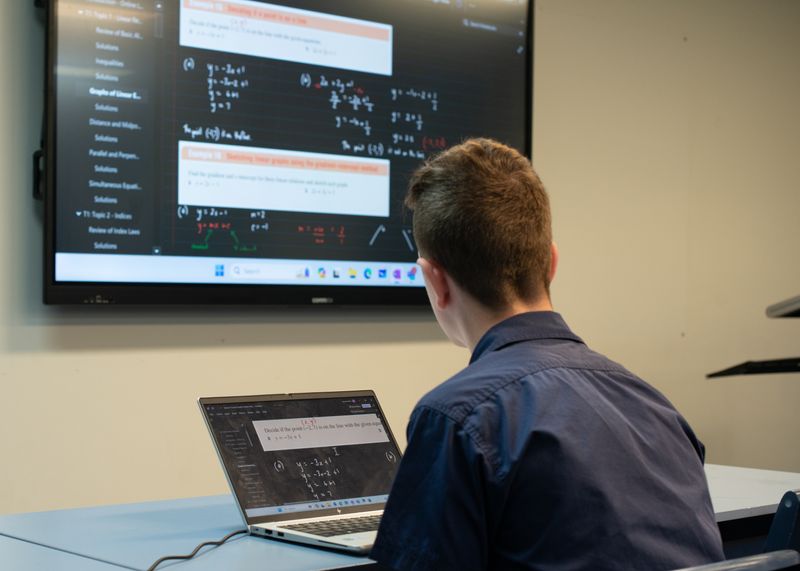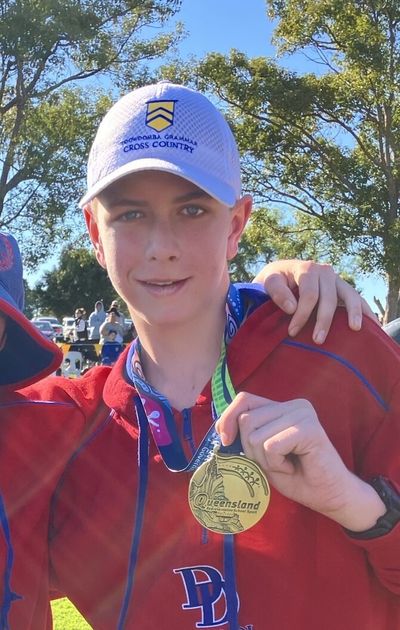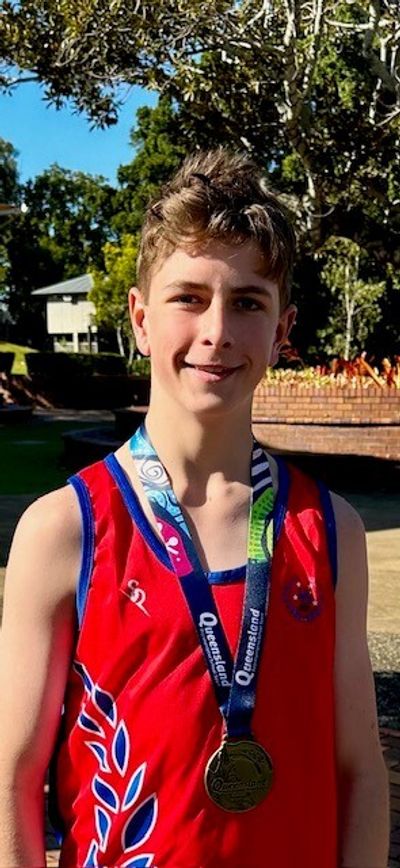“It didn’t really have a big impact on me,” said Mitchell stoically. My parents were much more upset than me; I just rolled with it.”— Mitchell Wilkes

Imagine being told that your world of colour was going to be dark in a few years, that you were slowly going blind.
That was the heart-wrenching diagnosis for Year 10 student, Mitchell Wilkes, right on Christmas in 2021. Mitchell’s mum noticed he wasn’t reading properly and had a gut feeling that there was something wrong with his eyesight. A trip to the optometrist revealed a thinning in the retina, and further tests showed that Mitchell had a genetic condition called Stargardt Disease, a juvenile macular degeneration illness that results in slow central vision loss.
Since then, Mitchell has lost a considerable amount of vision. He had 6/16 when he was first diagnosed and now sits at 6/60. There is a possibility that he could go completely blind by the age of 30, but if he’s lucky, he might retain some peripheral vision. He currently needs to look above a person’s head to see their face. He also adjusts the way he looks at everything to ensure objects are not in his blind spot. However, the details of objects tend to be blurry.
“The School and staff have been really supportive of my learning,” said Mitchell gratefully.
“Mr Ron Robinson and the IT department have put a lot of things into place to make it easier for me, providing me with a more powerful laptop, better access to devices and assistance with exams. I’ve also received great support from the Head of Department for Diverse Learners, Ms Amanda Gibson.”
“I have one classroom that has special equipment where the other students join me. All my classes except science and music are held in this room.”
Mitchell uses the default magnifier on his laptop and has a special iPad that zooms into the whiteboard at the front of the class. His teachers always check in to ensure he’s coping with the material. They also provide extra support when required, ensuring Mitchell has larger resized documents and worksheets. It’s these little things that have made the challenges at school much easier to cope with.

“The biggest challenge for me is mobility; crashing into things and not being able to recognise people until they’re really close to me, that’s really annoying,” said Mitchell.
“But I’ve got great friends here at TGS, and all the boys understand and work around my condition. They’re really good about it.”
Mitchell says his other senses have become heightened to compensate for the loss of his vision. His excellent hearing and exceptional memory are both particularly useful for his co-curricular activities. Mitchell is an avid musician, runner and mountain biker.
“I’m very slow and cautious on new mountain bike trails. I map them out carefully then memorise it so I can ride them normally next time,” said Mitchell confidently.
“My good hearing provides me with an alert system; I can hear other riders braking, which lets me know something is ahead. I love the challenge of mountain biking, going fast and free.”
Mitchell also loves running; he takes every opportunity to experience the sense of freedom it brings him. He trains five to six days a week for the TGS cross country team. He’ll walk the course beforehand, memorising the track to ensure he can confidently run it without tripping. Mitchell has also had huge success in aquathlon events thanks to the help of his guide runner, fellow TGS student, Alby Galbraith.
“I’m so grateful for his support,” said Mitchell.
“There is a 50cm tether between us. We run arm-in-arm, and Alby guides me. We won the multiclass division at both the state championship in Hervey Bay and the nationals in Perth in March,” Mitchell explained.
“It was a huge achievement, and I don’t think I could have done it without Alby.”

Mitchell’s great memory also serves him well in his musical endeavours. He plays the saxophone for the TGS Concert/ Show Band, sings in the Choir and the Grammarphones and also plays piano. The music staff have been extremely supportive of Mitchell’s challenges. They cut the music into very magnified chunks, which he scrolls through with a foot pedal when learning the track. After he has quickly memorised the music, he can play the piece without a score.
“I love to just sit and play music,” said Mitchell.
“I really enjoy it, and it just relaxes me. I’m so appreciative of the support and guidance of all the music staff at TGS.”
With only two years left at the School, Mitchell is already thinking about his future. He would like to be a drone pilot and study podiatry at university. With all his strength and determination, there is no doubt he’ll achieve his goals.
“My blindness is just part of me. I won’t let it stop me,” said the determined young man.
“From what I’ve dealt with, it’s way easier to take any challenges as they come and let them add to you rather than hinder your growth.”
Update:
Continuing with his great running form, Mitchell has won gold at the Queensland Cross Country State Championships in the Under 15 multiclass category at Bald Hills in Brisbane on Saturday, 13 July. It sees him now travel to the National titles at Yarra Glen near Melbourne where he'll compete from 20 to 23 August 2024. We continue to wish him all the very best!


Latest Blog
Outdoor Pursuits and Activities Week - Developing Good Character Beyond the Classroom
We offer a range of enrichment activities for our boys, but the last week of Term 1 is a very special opportunity for all of our Senior School students. It's Outdoor Pursuits and Activities Week, which provides age-appropriate physical challenges in a safe, well-supervised environment. Activities on the various camps may include ropes courses, rock climbing, bodyboarding, surfing, mountain biking and canoeing. The aim is to foster a love of the outdoors and an appreciation of the environment.…
Stories behind key TGS staff helping shape our students
It was my great privilege to join TGS as Head of House - Boyce Boarding in 2024. The opportunity to lead these young men of character on their TGS journey carries great weight but is also enormously exciting. Embarking upon this project alongside my wife Meg as Boyce Boarding House Manager strengthens the team further. I am hopeful that we will demonstrate to the boys how positive relationships can foster a warm and supportive environment. I know that many of our boys are familiar with strong…
More Than Just an Education and That Makes All the Difference
Toowoomba Grammar School excels in its extensive co-curricular programs, particularly in performing arts and sports. Our boys learn that success comes from hard work and dedication. This ethos is inspired by quotes like “You don’t have to be great to start, but you have to start to be great,” “The harder I work, the luckier I get” and the words emblazoned on our P.B. Hauser Aquatic Centre wall “Success is the celebration of preparation.” These opportunities allow students to excel in programs…
Stewardship: Leading the Way in Safety, Sustainability and Security
However, the challenges facing the Director of Facilities, Mr Bengie Dickeson and the Director of Information Technology, Mr Ron Robinson certainly are. This month's weather has been nothing if not unpredictable and it's in those conditions that both these men's skills come to the fore. With Tropical Cyclone Alfred and its threat to our School campus and community - Mr Bengie Dickeson and Mr Ron Robinson played integral roles in keeping everyone and everything on our 150-year-old campus safe.…
Pursuing New Horizons in Horticulture
Jake Moon is a sixth-generation primary producer. He is dedicated to agriculture and is currently working at his family’s St George farming enterprise, tackling some of the sector’s biggest challenges. The 28-year-old says his family moved to the St George irrigation precinct in 1978, initially growing rockmelons and watermelons, hence the business name Moonrocks. Seasonal and market changes led them to switch crops frequently, growing grapes, broccoli and even wax flowers over the years.…
Crushing it at Cricket and Conveying Culture
He explains that he’s named after Yarramundi, a respected and influential leader of the Richmond tribes of the Dharagnora (Hawkesbury-Nepean region of New South Wales) and a respected elder of the Boorooberongal clan of the Dharug people. “I’m proud of my culture and excited to have just started learning Dharug Dalang as part of the language revitalisation with my family.” During one week late last year he juggled exams, balanced representative cricket in Mackay with being the emcee of the…
Disappointment: A Necessary Part of School Life
Schools are inherently hopeful and happy places. Their natural focus on growth, connectedness and preparing youth for a better future creates an optimistic atmosphere in which ambitions are born. These positive emotions and experiences lay the foundation for our expectations and while these can be highly motivating, they come with a catch: the greater our expectations, the greater the disappointments, too. Disappointment is not a popular feeling. Rightly so, not many of us wish to feel sad,…
Boys and Belonging at TGS
As a boarding master of adolescent boys, my role fundamentally concerns pastoral wellbeing and character development to support a successful academic journey. A positive sense of belonging — where boarders feel safe, supported and heard — is fundamental to an effective boarding environment. As such, I felt there was a distinct connection between the International Boys’ Schools Coalition’s (IBSC) theme for the 2024–25 Action Research Cohort, “Boys and Belonging” and what I believe is best…
Fostering Growth and Resilience
This philosophy is vividly demonstrated through our Junior School MATES program, an initiative designed to equip boys from Prep to Year 6 with the skills they need to thrive both in and out of the classroom. Year 6 leader Hugo Seaby epitomises what the program is all about. As a leader in Stephens House, he explains its importance: “It’s about spending time with the younger boys and learning about honesty, respect, kindness and other attributes like that.” He said that it’s helpful for the…